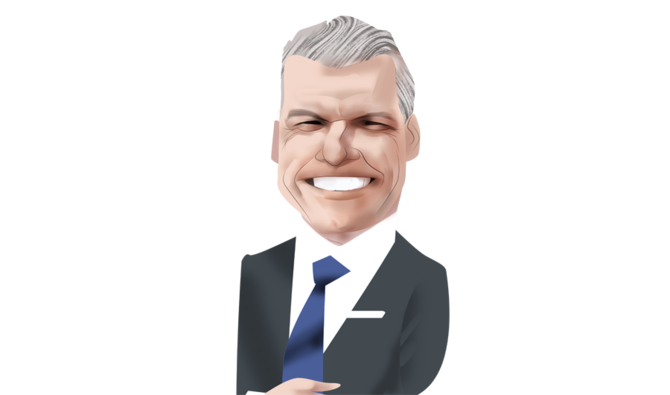At a recent “swing through” the Middle East, Torsten Muller-Otvos, the chief executive of luxury car maker Rolls-Royce, was asked what he regarded as his “perfect drive.”
The 59-year-old German listed the coast of Cornwall in the UK, the south of France, as well as an urban tour in the shape of a night auto-clubbing in London in the new Black Badge Cullinan — the “King of the Night” in the Rolls branding jargon.
But his aides revealed another drive high up their list of priorities, and under negotiation at the moment. Rolls would like to drive the Black Badge through the spectacular scenery around AlUla in northwest Saudi Arabia.
That would be a dream photo-shoot. Setting the jet black car amid the red canyons and architecture of the ancient Nabatean kingdom would be visually spectacular, and would send a subliminal message about the long association, even the long love-affair, Rolls has enjoyed in the Middle East.
Muller-Otvos explained: “This region is very important for us. It is our third-largest region by sales, after the USA and China, which is quite a statement on its own, and now we have the Cullinan, which is a big attraction here.”
The Cullinan is the company’s first foray into the SUV market, and has been a long time in the planning. It also owes something to the Middle East, because, as Muller-Otvos revealed, one of the inspirations behind the concept was the fleet of Rolls-Royce armored cars deployed by Captain T.E. Lawrence — “Lawrence of Arabia” — during the war against the Ottoman Empire in the First World War.
Not that Lawrence’s deadly killing machines have much in common with the extravagant cars the Middle East loves to buy and drive. The region is the biggest consumer of “bespoke” vehicles in the Rolls-Royce range, and cars are customized to a fine degree. “Everything we ship to the Middle East is highly bespoke. They are colorful, they are embroidered, they are localized, and it is wonderful to see them in the bright sun here,” he said.
BIO
Born: Germany, 1960
Education:
- Ludwig-Maximilians Universitat Munich
- University of Augsburg.
Career
- Director of “Mini” branding for BMW.
- Senior vice president, central marketing and brand management BMW.
- Senior vice president, product management automobiles and after sales.
- Chief Executive Officer, Rolls-Royce Motor Cars
Muller-Otvos has been with Rolls-Royce for ten years, after a previous executive term at brand management and marketing at BMW, which has owned Rolls-Royce since 1998. He has been credited with rejuvenating Rolls with the introduction of new models and designs, while maintaining its reputation as the number one luxury car maker in the world. In that decade, sales have increased fourfold to about 4,000 per year, with a considerable chunk of that increase heading to the Arabian Gulf.
“I always want to have two windows open — heritage and innovation,” Muller-Otvos said.
The Cullinan was received quite critically in some parts of the media worldwide because of this perceived departure from Rolls-Royce’s illustrious heritage. “We would never neglect our heritage,” he insisted.
The expansion in the Middle East was very much a part of this strategy of extending the brand. A decade ago the product range consisted essentially of variations on the august Phantom, the chauffeur-driven car of choice of royalty and presidents.
Since then, he has introduced newer younger models such as the Dawn, the Wraith and the Ghost, and now the Cullinan aimed at a younger aspirational market of high-net-worth individuals, and — increasingly — at women who like to drive themselves and who want to customize their vehicle to a high degree.
Of the Cullinan, which became available in the region last year with a basic price tag in the region of half a million dollars, depending on the degree of bespoke customization, he said: “It was quite an experiment when it landed, but the reality has been far higher than the expectation.”
The car has done very well in Saudi Arabia, combining luxury with top-of-the-range off-road capabilities that would handle the gorges and wadis of AlUla with ease. But one question that he is frequently asked in the Kingdom is whether Rolls-Royce would ever design a car especially for women.
“I would never do that. The last thing any woman would want to see is a car just for them. The Black Badge, probably the most masculine vehicle Rolls has ever produced, is selling well among the Kingdom’s females without the need for any special features, for example to cater for pregnant women.
“We are always looking at both genders when we design our cars. Features like multi-position steering wheels and auto-adjustable seats are standard. But I would never design one with a hanger for a handbag — that would be highly ridiculous,” he said.
“But our female customers are super-powerful people, they are business leaders, they run their own companies, they are powerful people. In bespoke, our motto is ‘your wish is my command’, so everything is possible,” he added, holding out hope for all those who long for a Rolls-Royce handbag hook.
“I have never said no to any customer’s request — as long as the legal rules allowed it.”
Muller-Otvos points to the time he had to disappoint a Rolls-Royce owner who wanted a cigar humidor installed in the dashboard. “That would have conflicted with the airbags and other safety requirements,” he explained.
One innovation which captures his enthusiasm is the move toward electric vehicles. “I think customers will embrace it. We have lots of clients who already own an electric car, so there will be little resistance, as long as it is an authentic Rolls-Royce. The electric concept already fits well with the brand because it is powerful but quiet. There will soon be a point where we can do it,” he said.

The Cullinan has been tested in the world’s toughest terrain, including Arabian deserts. (Photo courtesy of rolls-roycemotorcars.com)
The Middle East is unique within the Rolls-Royce global market in another way too. Economic activity is still, despite the various strategies toward diversification away from oil dependency, highly variable according to the price of crude oil on global markets. Is there a direct relationship between the oil price and Rolls-Royce sales?
“We are not immune to recessionary tendencies anywhere in the world. Around 80 percent of our ownership is dependent on industry or (people) running their own business, so when you’re business is under constraint, maybe you can’t afford a new Rolls-Royce. I would say there is an indirect relationship between the oil price, the economy and our sales. There was a blip a couple of years ago that we have recovered from now,” he added.
On the Saudi stop of his Middle East tour, one of the questions that arose with their local partner, Mohamed Yousuf Naghy Motors, was whether the initial public offering (IPO) of Saudi Aramco would drain financial resources from the luxury car market. “Nobody expects it to affect our business. To say it (the IPO) would drain money out of our business is just too black-and-white,” he said.
King Abdulaziz bin Saudi, the founder of Saudi Arabia, famously had a special Rolls-Royce given to him by British prime minister Sir Winston Churchill, and ever since the vehicle has been synonymous with royalty in the region. Some countries even discouraged wealthy non-royals from buying the vehicles, but this has changed now, and Rolls-Royce is ready to sell its product to anybody who can afford it.
But it would never go on a mass-marketing campaign, said Muller-Otvos. “I would never want to compromise the pricing segment. To lower the prices of a Rolls-Royce is not a thing we would do,” he said, in contrast to some other luxury car makers in the region who have aggressively gone for market share at the expense of exclusivity.
As the boss of arguably the ultimate luxury car, Muller-Otvos is acutely conscious of the demands of the global luxury brand market, and of the unique requirements of the Middle East, as well as the Rolls-Royce heritage.
“The ultra-high-net-worth people in this region own many cars. They have garages the way that we have wardrobes, with Lamborghinis and Ferraris there too. That is what the luxury business is all about,” he said.
But whatever vehicle is parked alongside it, the Rolls-Royce will always be special, he believes. It has been estimated that about 75 percent of the cars produced under the famous “spirit of ecstasy” mark since it was founded 115 years ago are still on the road, and the tradition of holding onto them is especially strong in the Arab world.
“In the Middle East these cars are handed down through generations. They carry the family crest and will never be sold,” he said.
























